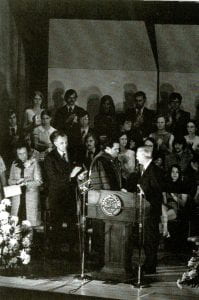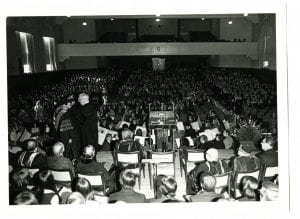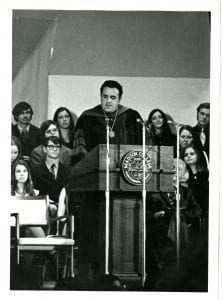Post Author: Amanda Castellano

On December 4th, 1971, Dr. Carrier was officially sworn in as President of Madison College. Carrier had already acted as the official president for almost a year, but it is an accepted practice at colleges and universities to wait a year for a new president to be sworn in. This year acts as a “trial period” for the president to see if he will be a good fit with the college.
Carrier’s inauguration address, formally titled as “Madison College: Challenge of the Seventies”, acted as Carrier’s evaluation of what needs he had seen in the past year that he felt needed to be addressed and his future goals for the university. In his master’s thesis, Fred Hilton compiled a succinct list of what Carrier outlined in his inauguration. This list is divided into sections and goals are laid out in each area.

Student Body Configuration:
- The constituency of the college will continue to be comprised of a large number of residential students between the ages of 18 and 21.
- Student enrollment should reach 7,000 by 1980.
- Programs should be developed to attract more male students, more adult students, and, in general, representatives of all levels of economic and social status.
- Forty percent of the student population should be male students by 1980.
- Counseling programs should be established to provide students with more information on the college’s educational programs.
Community Service:
- The College should conduct outreach programs for the community through the use of the media, seminars, short courses, and workshops, with the Division of Continuing Education established to achieve these objectives.
- The bulk of the College’s resources, talents, and energies must be dedicated to the primary mission of teaching and to the improvement and expansion of the learning environment.
- The College will continue its role as a liberal arts institution.
- The College will continue its function of preparing teachers by offering courses in the liberal arts and in specialized fields of education.
Proposed New Programs/Improvement of Existing Programs
- More attention needs to be devoted to transfer students, and to educational, professional, and personal guidelines for students.
- Procedures should be developed to provide ease of admission and matriculation for adult and special students.
- Greater emphasis must be placed on professional and pre-professional studies in business, computer science, pre-medical, pre-law, and the applied arts.
- The feasibility of new programs such as paramedical programs and a General College needs to be explored.
- The inter-disciplinary synthesis of knowledge between fields of study must be reflected in the organization of the College for the future in professional and non-professional studies, at every level of the student’s college career.
- Summer grants must be available for faculty members who wish to further their skills in improved teaching and learning.
- The College must study future cooperative arrangements with sister institutions in the development of program delivery systems, particularly at the graduate level.
- Curriculum planners should be flexible in the development of programs to maximize the learning experience for each student.
- The College shall continue to offer programs at times and in ways that provide the greatest benefit to residential students, but more thought should be given to the special needs of commuting students and other who live off-campus.
- Research must be conducted on improved teaching and improved teaching techniques. To this end, a Center for Improved Teaching and Learning, with an expanded media center, is proposed.
Graduate Studies:
- The College will continue to provide graduate studies for students who cannot afford to leave the region.
- The graduate program shall continue to serve as a springboard into doctoral programs at other universities.
- New graduate programs shall be developed at the College, but not at the expense of undergraduate programs and only when they meet a demonstrable demand and can be adequately funded.
Research Activities:
- Research will be encouraged at the College, but not at the expense of quality teaching.
- The major thrust of the College-wide research will be service-oriented

It is apparent that most of these goals are geared towards starting new programs or improving existing ones. Madison College still had its focus in educating its students to become teachers, but Carrier felt that Madison needed to move away from this focus on one program and instead expand its available program offerings. Madison also needed to start offering more graduate programs and begin a doctoral program if it ever wanted to become an accredited university. The student body needed to be expanded and become more diverse for it to attract students from up and down the East Coast. Carrier also wanted to change the focus of the faculty from largely a teaching focus to one in which professors contributed to their field of study and were experienced in research and publishing their work.
All of these goals are focused on one focal point: Carrier’s dream of expanding Madison College into a regional university that could offer something for everyone. Carrier wanted Madison to become the premier university in Virginia and his inaugural speech laid out the basic framework of his plan to achieve this dream.
Works Cited:
Hilton, Fred. “Changing from a College to a University: Madison College to James Madison University, 1971-1977.” Master’s thesis, James Madison University, 1996.
